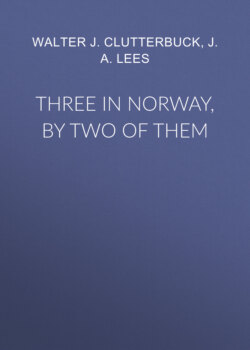Читать книгу Three in Norway, by Two of Them - J. A. Lees - Страница 18
На сайте Литреса книга снята с продажи.
July 16.—
ОглавлениеIt was a lovely morning, and the lake looked its best, but it is not strikingly beautiful compared with many that we have seen. It has high rugged hills on both sides, and pine woods down to the water’s edge, and some small islands dotted about the upper end of it; but the lake is rather shallow, the pine trees rather stunted, and there are a good many wooden huts and sæters on the hill-sides, which, although they appear to be mostly uninhabited, detract from the wildness of the scenery.
The natives have one or two boats on the lake, and do some fishing on their own account. To-day we saw a man engaged in the atrocious employment of fishing with an ‘otter.’
Any natives who see our camp when rowing past come to shore to inspect us and our belongings. They all adopt the same course of procedure. They land, and stare, and say nothing; then they pull up their boat and make it safe, and advancing close to the tent stare, and say nothing either to each other or us. Then Esau says confidentially, as if it was a new and brilliant idea (he has done exactly the same thing some scores of times), ‘We’d better be civil to these fellows; perhaps they could bring us some eggs, and they look pretty friendly.’ The natives are all the time staring and saying nothing. Then Esau remarks in Norwegian, ‘It is fine weather to-day; have you any eggs?’ To this the chief native replies at great length in his own barbarous jargon, and Esau not having understood a single syllable answers, ‘Ja! ja! (yes), but have you any eggs?’ Then aside to the Skipper, ‘Wonder what the deuce the fool was talking about?’ Soon the natives perceive that their words are wasted, and relapse into the silent staring condition again, and after a time and a half, or two times, they depart as they came. Sometimes they return again with eggs in a basket, when we pay them well and give them some fish; at other times they look upon us as dangerous lunatics, and avoid us like the plague.
Esau learnt this habit of asking for eggs when we were on a fishing expedition near the south coast of Norway. On one occasion there we arrived at a small village, with an enormous quantity of trout that we had caught in the adjoining fjord; and found a small crowd of about fourteen or fifteen seafaring men, idly lounging round an open space between the cottages. He first went round and presented each of those men with two trout solemnly, without a word, as though it were a religious ceremony. Then he began at the first man again and said, ‘Have you eggs?’ and receiving a reply in the negative, he went on to the next, and to each one of the group asking the same weird question.
The men, who had been chatting busily amongst themselves up to the moment of our arrival, became silent; they did not laugh, but only looked at one another; and one of them shyly felt in his pocket to see if there were any eggs there whose existence he might have chanced to forget.
Presently, as we could get no eggs, we moved off sorrowfully but not discouraged; and the men remained looking after us silent and uncertain. Thus the interview ended, and we regained our boat.
The beach here was capital for bathing, and we enjoyed a delightful tub this morning, the more pleasant indeed because at Dalbakken we slept in our clothes, and only had a soap-dish to wash in next morning. Immediately after bathing we lit a fire, and the cook commenced operations; the office of cook being held alternately by each of us for one day. The man from Dalbakken brought us some milk, so we indulged in coffee. When we have only ‘tin milk’ we drink tea; for though tin milk will do fairly with tea, we think it wretched with coffee. After breakfast we each took our canoe, and went fishing wherever the spirit moved us, taking lunch with us. On a day of this sort, if the fish are rising we have a great time, and if they won’t rise, we lie on the bank in the sun and smoke, or sketch, or kill mosquitoes, and have a great time in that case also, so that the hours pass in a blissful round of enjoyment, and all is peace. Having each one his own ship we are quite independent, only taking care to return to camp about six o’clock to get dinner ready. After that there is nearly always a rise, and we fish till about eleven, when we generally turn in, though it is by no means dark by that time; and on a few occasions when the fish were rising very well, we have fished on all through the night and into the next day, losing count of the almanack, and conducting life on the principles of going to bed when tired, and eating when hungry, so that, like the Snark, we might be said to—
